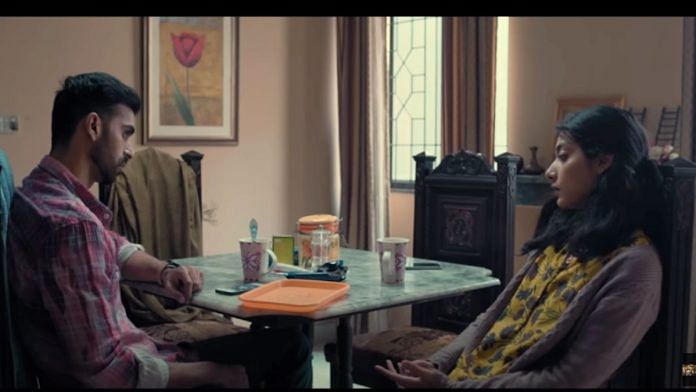New Delhi: Before he produced the international award-winning Pakistani film Joyland, filmmaker Sarmad Khoosat had made Zindagi Tamasha. But much like its name, the controversy around the film killed its 2020 debut. Now, after three years, the filmmaker is “finally setting his film free”. Zindagi Tamasha was even slated to be the country’s official entry to the Oscars in 2021.
However, claiming anti-Islamic content, Pakistan’s government postponed screenings so that the Council of Islamic Ideology could assess the film. Following months of controversies, protests, censorship and death threats, Khoosat announced that he will not release the movie at all.
“A fundraiser with an NGO led to a wide circulation of the torrent links of the movie, illegally. I am heartbroken and I decided that the film should reach people the right way,” Khoosat told ThePrint.
For him, this was “the straw that broke the whole tension and the mound that was weighing on him.” August seemed to be the right month to release the film.
“It is the month of Independence. Pakistan celebrates its Independence Day on 14 August. Releasing the movie now felt like the right thing to do,” he added.
The bilingual film explores intolerance through the eyes of Rahat Khawaja (played by Arif Hassan), a devout Muslim landowner who also happens to be a poet. He sings hymns in praise of the Prophet and enjoys a celebrity status in his hometown until he attends the wedding of a friend’s son and ends up dancing to an item number. The video of his dance immediately goes viral, and Rahat is chastised by his community for his “indecent” performance. The criticism spans from Facebook memes to outright exclusion from events.
Also read: Pakistan defence minister spews ‘garbage’ in parliament, insults PTI women lawmakers
Labelled blasphemous
When Zindagi Tamasha‘s trailer was released in October 2019, the backlash was so swift that it was taken down too. Religious conservatives were particularly outraged. The Islamist political party Tehreek-e-Labbaik Pakistan (TLP) organised protests and called the film, “a severe test for the Muslims of the Islamic Republic of Pakistan”. They party also called the movie “blasphemous”.
In the wake of death threats, outrage, and protests Khoosat wrote an open letter to the then prime minister of Pakistan Imran Khan.
“Like any other film, made in any part of the world, Zindagi Tamasha is a reflection of its setting. My team and I explored themes around gender constructs, class divisions and complex human experiences. There was never any intention to attack, to point fingers at or humiliate any individual or institution,” he wrote in the letter.
But the legal drama had only just begun.
After being submitted for approval for the second time to the Central Board of Film Censors, the picture was re-edited with minor modifications. The Senate Committee for Human Rights in Pakistan allowed the distribution of the film in 2020, but two days later, a petition in a Lahore court was filed seeking a lifetime ban on the film.
The Sindh Board of Film Censors banned it three days before its scheduled release, fearing that it might provoke disturbance in parts of the community. Punjab’s censorship officials followed suit.
The film did, however, premier at the Busan International Film Festival in 2019 and became the first Pakistani film to receive the festival’s renowned Kim Ji-Seok Award. In 2021, it received the Snow Leopard Award for Best Film at the 6th Asian World Film Festival (AWFF).
According to Khoosat, appeals to OTT platforms like Netflix and Amazon Prime to stream the movie were not entertained. So, he decided to release Zindagi Tamasha on YouTube—a platform he considers to be ‘democratic and accessible’.
Also read: Zayn Malik’s album teaser ridiculed by Pakistanis for being too ‘Pakistani’
Raving reviews
This was also the first time in the history of Pakistan that the approval of the Council of Islamic Ideology (CII), was sought on the content of a film. The review never took place and the release was stalled.
Since its YouTube debut on Friday, the film has been hailed by fans and critics.
“Zindagi Tamasha is as much about the perils of social media, art, family, love, marriage, and freedom of expression, as it is about religion, repression, and isolation,” Shehzad Shaikh, founder of The Pakistan Podcast tweeted. The irony of the parallels between the protagonist and the director were not lost on him.
“Zindagi Tamasha is the story of a man who wanted to express himself, and the price he paid for it. It is rather unfortunate that that has also become the story of Sarmad Khoosat,” Shaikh wrote.
Aamna Saini, founder of Something Haute called the movie “heartbreaking reflection of everything that’s wrong in our society when it comes to the flag bearers of religion.”
For Khoosat, the release is a weight off his back. “This film had to be delivered. It was weighing heavy on me.”



